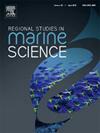俄乌冲突对全球航运供应链弹性的影响
IF 2.4
4区 环境科学与生态学
Q3 ECOLOGY
引用次数: 0
摘要
本研究利用2000年至2023年期间来自27个国家的面板数据,应用分位数控制方法(QCM)定量调查俄罗斯-乌克兰冲突对全球海上供应链弹性的影响。结果表明,冲突显著降低了全球海运供应链的弹性,其中欧洲(15.09%)、(15.09 %)、亚洲(12.09 %)和非洲(7.75 %)的降幅最为明显。相比之下,冲突对美洲和大洋洲的供应链弹性没有统计上的显著影响。具体而言,俄罗斯和乌克兰的海上供应链弹性分别下降了2.78 %和1.35 %。这些发现为指导政策制定减轻地缘政治冲突对海上供应链的影响提供了经验证据。本文章由计算机程序翻译,如有差异,请以英文原文为准。
Impact of the Russia-Ukraine conflict on the resilience of global shipping supply chains
Utilizing panel data from 27 countries spanning the period from 2000 to 2023, this study applies the Quantile Control Method (QCM) to quantitatively investigate the impact of the Russia–Ukraine conflict on the global maritime supply chains resilience. The results indicate that the conflict has significantly reduced the resilience of global maritime supply chains, with the most pronounced declines observed in Europe (15.09%),(15.09 %), Asia (12.09 %), and Africa (7.75 %). In contrast, the conflict did not statistically significant impact on the supply chain resilience in the Americas and Oceania. Specifically, the maritime supply chain resilience of Russia and Ukraine declined by 2.78 % and 1.35 %, respectively. These findings offer empirical evidence to guide policymaking on mitigating the impacts of geopolitical conflicts on maritime supply chains.
求助全文
通过发布文献求助,成功后即可免费获取论文全文。
去求助
来源期刊

Regional Studies in Marine Science
Agricultural and Biological Sciences-Ecology, Evolution, Behavior and Systematics
CiteScore
3.90
自引率
4.80%
发文量
336
审稿时长
69 days
期刊介绍:
REGIONAL STUDIES IN MARINE SCIENCE will publish scientifically sound papers on regional aspects of maritime and marine resources in estuaries, coastal zones, continental shelf, the seas and oceans.
 求助内容:
求助内容: 应助结果提醒方式:
应助结果提醒方式:


